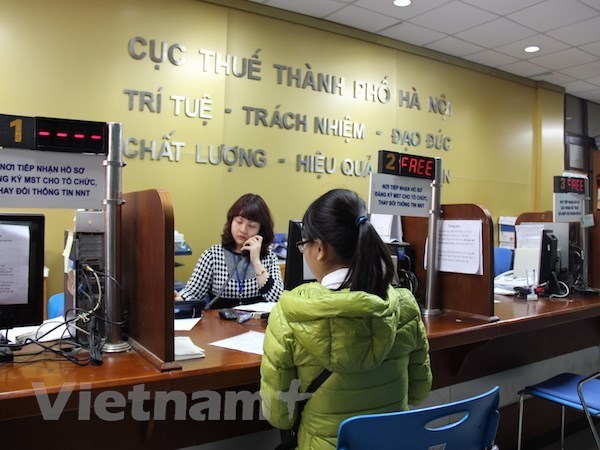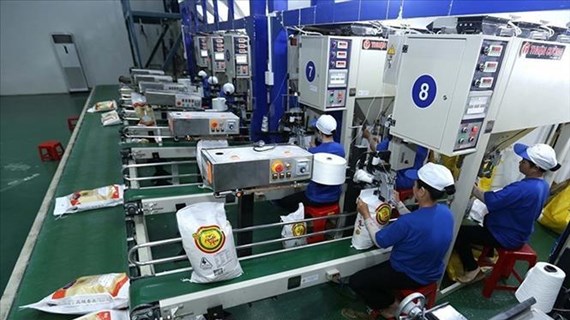Vietnam makes considerable progress in e-payments
 Instead of going to the tax agency to directly fill tax declarations and then going to banks for tax payment, individuals can make electronic tax declarations and payments. (Photo: VietnamPlus)
Instead of going to the tax agency to directly fill tax declarations and then going to banks for tax payment, individuals can make electronic tax declarations and payments. (Photo: VietnamPlus)Hanoi (VNA) - Vietnam has recorded significant progress in applying cashless payment, especially in the public service field.
The banking sector has always committed to a ready-to-serve infrastructure for non-cash payments for public services. The infrastructure system is waiting to connect to ministries, sectors and localities.
Representatives from the State Bank of Vietnam said after five years of implementation, the scheme on development of non-cash payment for the period of 2016-2020 has proven effective, contributing to promoting non-cash payments in the country, especially in the payment of tax, utilities bills, tuition and hospital fees via banks.
This has helped reduce a large amount of cash in circulation, thus reducing the enormous social costs related to releasing money such as printing, checking and transporting, and the storage and destruction of old and torn money.
On the other hand, many achievements of the 4th industrial revolution have been strongly applied in the payment field such as analysing customer behaviours on Big Data; biometric authentication; quick response code (QR Code) application; encryption of card information (Tokenization), and contact and contactless payment using cards.
Card payment has continued to thrive with an average growth of 51.4 percent in quantity and 33.8 percent in transaction value in the 2016-2019 period. In particular, payment on mobile platforms has also recorded an impressive growth with an average growth of 85 percent in quantity and 158.5 percent in transaction value.
Electricity, tax sectors taking lead in e-payment application
Vo Quang Lam, Deputy Director-General of the Electricity of Vietnam Group (EVN) said the percentage of electricity bills paid via banks has increased sharply over the years, to 64 percent of the number of bills from only 14.88 percent in 2015. Payment made by other non-cash methods reached 54.64 percent in terms of bills and 72.32 percent in the value of bills.
Lam said to promote non-cash payment in paying electricity bills, in 2019, EVN has digitised 100 percent of business operations and customer services and provided electricity bill services on the national public service portal. In 2020, EVN promotes the development of digital companies with connected point accumulation platforms, and provides its services on digital platforms.
In the near future, the electricity sector will gradually reduce and eventually stop collecting payment in cash for electricity bills, and accelerate online payment, he said, stressing that the sector will work with banks and payment intermediaries to replace the cash collection.
Likewise, representatives from the General Department of Taxation also said as of December 31, 2019, up to 99 percent of the existing businesses had registered to pay taxes electronically. The tax amount paid via digital platforms in 2019 totaled 700 trillion VND.
Regarding the pilot of e-invoices, by the end of 2019, the General Department of Taxation supported enterprises to participate in piloting electronic invoices with codes of tax authorities in Hanoi, Ho Chi Minh City and central Da Nang city.
Statistics from the department showed that the number of businesses that applied electronic invoices with the tax authority's codes as of July 2019 was 279, with more than 8.1 million invoices worth over 103.6 trillion VND being validated. The total validated value-added tax stood at over 8 trillion VND.
In particular, as many as 34 domestic banks and 19 foreign banks, and 12 intermediary service providers of electronic data transmission joined in providing service of e-tax payment for tax payers.
Experts said that payment for public services via banks has helped increase the cash flow, shorten the time of capital cỉculation via payment systems, and promoted capital transfer, thereby contributing to increasing capital use efficiency and improving the competitiveness of the economy.
The SBV reported that the value of transactions via the Internet increased to over 22.2 trillion VND in 2019 from only 5 trillion VND in 2015.
Payment via mobile platforms also recorded impressive results, reaching over 5.77 trillion VND in 2019 from 1.85 trillion VND in the previous year.
Regarding creating bank accounts, the yearly average growth in terms of individual accounts and total balance in such accounts in the 2015-2019 period reached 10.26 percent and 25.41 percent, respectively.
As many as 79.8 million accounts were created in 2018 and the number increased to 88.5 million in 2019 with a balance of 379.84 trillion VND and 499.72 trillion VND, respectively.
Infrastructure system ready for non-cash payment
Although the electricity, tax and customs sectors recorded a 90 percent connection rate with banks, many public schools and hospitals have not been able to collect money through POS payment infrastructure or mobile devices.
There are only a few localities that implemented non-cash payment in the above-mentioned fields, including Ho Chi Minh City.
Vice-Chairman of Ho Chi Minh City People’s Committee Tran Vinh Tuyen said the city is moving towards a smart city, with its key goal of building a cashless society.
80 percent or 400 schools in HCM City have implemented payment via banks, while the rate in medical establishments remains modest, reaching only 50 percent.
In Hanoi, although there are a number of hospitals and schools that have applied cashless payment, they only account for a small percentage.
Pham Tien Dung, head of the SBV’s Payment Department said the bank will direct relevant ministries and sectors to complete a draft decree on non-cash payments along with guiding documents, and submit to the Government for approval.
These legal documents will include specific regulations guiding electronic know-your-customer (e-KYC) methods, and the pilot use of telecom accounts to pay for small value services (Mobile Money).
The banking sector will also promote the supply of payment services on Mobile Banking platforms, Dung added./.












